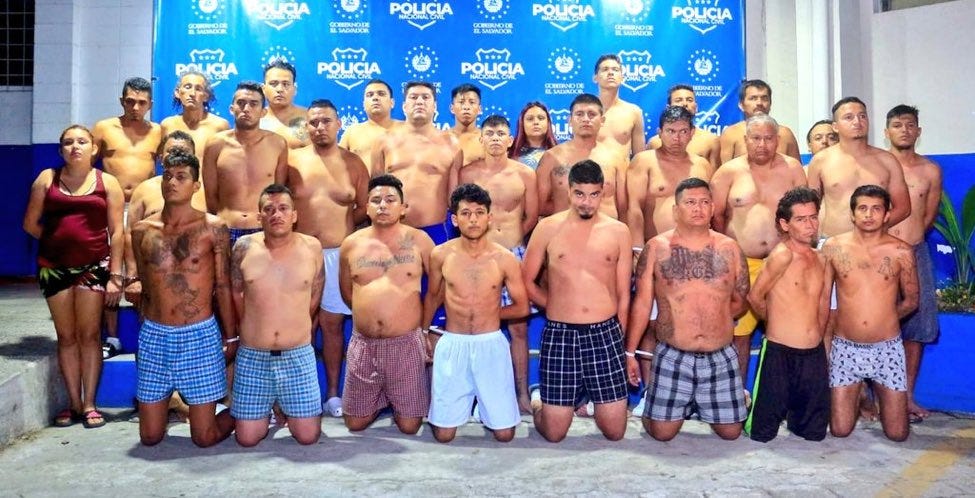
Avast, me hearties!
We hope your week has been more rum punch than rum deal.
In this week’s podcast, Josh looks at how the President of El Salvador, Nayib Bukele, has responded to a spate of murders with a brutal authoritarian crackdown, arresting well over 13,000 people and chucking them into prisons probably best described as dungeons. Many of those arrested appear to have nothing to do with gangs and observers on the ground say it pretty much amounts to rounding up poor men with tattoos. Bukele has also criminalized reporting on gang activity, prompting key critical voices in the media to flee the country.
In the news this week:
Ex-President of Honduras Juan Orlando Hernández has been extradited to the United States on charges of drugs and arms trafficking. He was moved in an operation involving the police, the military, and agents from the US Drug Enforcement Agency. He was not accused during his presidency, which spanned two terms between 2014 and early 2022. However, he was mentioned in the sentencing of his brother, Antonio Hernández, who was sentenced to life in prison on the same charges by a New York court in 2019. The ex-president, often known as JOH, could face a similar sentence.
This week in the Argentine province of Chaco, the trial over the 1924 Napalpí massacre began. It’s estimated that 300-500 indigenous Qom and Moqoit people were killed when police and ranchers opened fire on a protest against working conditions on cotton farms. Victims included children and the elderly. The trial, which is starting 98 years later, is unprecedented: there will be no criminal consequences for anybody. Instead, it attempts to establish what happened, provide historical reparations, and formally establish that this was not a dispute between indigenous peoples, as was claimed at the time, but a massacre perpetrated by representatives of the Argentine state.
Also in Argentina, the heated dispute between the ruling coalition and the opposition in Argentina had a new forum this week: the Council of Magistrates, the body in charge of appointing and disciplining judges. The supreme court ruled in December 2021 that the council had to be reformed. Since Argentina controversially includes several politicians on the council, this is seen as a fight for political control of the judiciary and influence over the nation’s judges. The council’s members include deputies and senators from majority and minority parties, and the ruling coalition decided to formally divide its senate majority into its two constituent parties (its block of 35 seats became one of 21 and one of 14) to give it one more seat in the council. The opposition and several analysts attribute this maneuver to ex-president and current Vice President Cristina Fernández de Kirchner, who is head of the senate. As well as complaining vocally about all this, the opposition has decided to take the case to court, and has filed a criminal complaint against Fernández de Kirchner. Meanwhile, the ruling coalition in the upper and lower houses of congress and President Alberto Fernández’s government have come out in favour of the new division in the Senate.
The Government of Peru this week presented a bill to use drugs to “chemically castrate” offenders who rape minors and women. The proposal followed a horrific case in which a three-year-old girl was kidnapped and raped. Peruvian laws do not currently permit corporal punishment as part of a sentence, and several specialists have pointed out that it would be an extremely expensive “solution”, given the costs of the drugs that would be applied. In this case, the project will have to be debated in Parliament. In 2006, following another case involving the rape of a child, then-president Alan García proposed the death penalty for rapists. Needless to say, he was not successful. According to CNN, chemical castration is legal in countries including South Korea, Poland, the Czech Republic, and some states in the US. Amnesty International describes it as a “cruel and inhuman” punishment.
And, as we say in Peru, the yapa: Brazil’s former president Luiz Inácio Lula da Silva has formally announced that he will run for president in October’s elections. Lula, as he is affectionately known, led the country between 2003 and 2011. He was prevented from running in the 2018 elections won by far-right Jair Bolsonaro because he was facing a series of major corruption charges, but the case against him fell apart after it emerged that the charges were politically motivated. Analysts say Lula is the current favourite, but Bolsonaro’s fortunes could change, between the exit from the pandemic and his popular Auxilio Brasil subsidy.
What we’re reading:
During World War II, a British intelligence officer is sent to interrogate a collaborator captured by the French resistance before they shoot him. The man says he'll only talk if he is handed over to the British military afterwards, but the officer knows he can't make that happen, so the collaborator takes his secrets to the grave. Should the officer have lied to learn potentially life-saving intel? Thomas Nagel examines the tension between the moral urges to do whatever will have the best consequences (consequentialism) and to respect the inherent wrong or right of an act (deontology).
What we’re listening to:
The Colombian podcast ‘Presunto Podcast’, dedicated to discussing the role of the media in the country, in its latest episode called: “A duel of stories and #symbolsofevil”, conducts a detailed analysis of how the news about the irregular military operation in Putumayo that left several civilians dead was reported. The panel made up of journalists with different experiences makes clear the importance of a rigorous record of a phenomenon as serious as extrajudicial executions. Their thesis is that journalism has been key to revealing government distortions, but also in some cases, its indirect ally, by taking government claims at face value.
Spanish words of the week:
Acarrear - Unsurprisingly, this means to carry, but it is often used figuratively to mean things like incur, lead to, involve, bring about, as in “puede acarrear consecuencias”
Ríspido/a - It sounds like a vogueish new variety of kale, this actually means “surly”
_____________
Noticias de la semana:
Yendo un poco más al norte, en Centroamérica, se dio ayer la extradición de Juan Orlando Hernández, expresidente de Honduras, a los Estados Unidos acusado de tráfico de drogas y armas. El traslado de Hernández se realizó en un operativo que involucró a fuerzas militares, policiales y agentes de la Administración para el Control de Drogas de Estados Unidos (DEA, por sus siglas en inglés. Según Insight Crime, si bien el expresidente no había sido acusado durante su mandato —dos gestiones entre 2014 e inicios del 2022—, ya había sido mencionado en la sentencia contra su hermano, Antonio Hernández, quien fue condenado a cadena perpetua en 2019 por los mismos cargos en una corte de Nueva York. Juan Orlando Hernández podría ser sentenciado con una condena similar.
Esta semana se inició en El Chaco, una provincia del norte de Argentina, el juicio por la masacre de Napalpí, una matanza contra indígenas de las comunidades Qom y Mocoví-Mocoi cometida por policías en 1924. El juicio, que inicia 98 años después, ocurre en un contexto sin precedentes: no habrá consecuencias penales contra nadie. Lo que se busca es esclarecer lo ocurrido, conseguir una reparación histórica y oficializar que no se trató de una disputa entre pueblos indígenas, sino una masacre perpetrada por representantes del Estado argentino.
En el plano político, la encarnizada disputa entre oficialismo y oposición en Argentina tuvo esta semana un nuevo escenario: el Consejo de la Magistratura, el órgano encargado de nombrar a todos los jueces de juzgados federales y nacionales del país. En diciembre del 2021, la Corte Suprema decidió una nueva conformación del consejo. Y teniendo en cuenta que en Argentina el consejo está integrado por senadores y diputados de los tres bloques con mayor representación, este caso es visto como una pelea por el control político de lo judicial y la influencia sobre los jueces. Esta semana, el oficialismo decidió dividir su mayoría en la Cámara de Senadores —su bloque de 35 se convirtió en uno de 21 y otro de 14— para hacerse con un sitio más en el consejo. La oposición y diversos analistas atribuyen esta jugada política a la expresidenta Cristina Fernández de Kirchner, actual vicepresidenta y titular de la cámara alta. Además de reclamar airosamente, la oposición ha decidido llevar este caso a la justicia y denunciar penalmente a CFK. En tanto, el oficialismo en ambas cámaras y el mismo gobierno del presidente Alberto Fernández se han pronunciado a favor de la nueva conformación en Senadores.
Tras el caso del secuestro y violación de una niña de 3 años, el gobierno del Perú presentó esta semana un proyecto de ley que plantea la “castración química” a través de fármacos para los violadores de menores de edad y mujeres. Actualmente, las leyes peruanas no permiten los castigos corporales como parte de una condena. Además, diversos especialistas han señalado que sería una “solución” muy costosa, teniendo en cuenta los precios de los químicos a aplicar. En este marco, el proyecto deberá ser debatido en el Parlamento. Ya en 2006, también tras el caso de la violación de una niña, el entonces presidente Alan García propuso la pena de muerte para violadores. De más está decir que no prosperó. Según CNN, la castración química es un castigo legal en países como Corea del Sur, Polonia, República Checa y en algunos estados de Estados Unidos. En tanto, Amnistía Internacional la califica como una pena “cruel e inhumana”.
Como decimos en Perú, la yapa:
Luiz Inácio Lula da Silva, expresidente de Brasil, anunció formalmente que será candidato en las elecciones presidenciales de octubre de este año. Lula, como se le conoce afectivamente, presidió el país entre 2003 y 2011. En 2018, se le impidió postular en las elecciones que luego ganó el ultraderechista Jair Bolsonaro, por haber sido condenado por delitos de corrupción vinculados al Caso Lava Jato. Sin embargo, en marzo del 2021, la Corte Suprema decidió anular sus condenas, argumentando que los juzgados que lo sentenciaron no eran competentes para hacerlo. La defensa de Lula también acusó que hubo una persecución política en su contra. Actualmente, los analistas dan a Lula como favorito para la contienda de este año, aunque prevén que la suerte de Bolsonaro pueda cambiar, teniendo en cuenta la salida de la pandemia y su popular plan “Auxilio Brasil”, que consiste en un pago mensual de 400 reales para aproximadamente 20 millones de brasileños.
¿Qué estamos leyendo?
Durante la 2da Guerra Mundial, un oficial de inteligencia británico fue enviado a interrogar a un colaborador capturado por la resistencia francesa antes de ser fusilado. El hombre dijo que solo hablaría si luego era entregado en manos de los británicos, pero el oficial sabía que eso no podía ocurrir y, por ello, el colaborador se llevó sus secretos a la tumba. ¿El oficial británico debió haber mentido para obtener información que posiblemente pueda haber salvado vidas? Thomas Nagel examina la tensión entre los impulsos morales que permiten hacer cualquier cosa con tal de obtener los mejores resultados (consecuencialismo) y el respetar la inherencia mala o buena de un acto (deontología).
¿Qué estamos escuchando?
El podcast colombiano ‘Presunto Podcast’, dedicado a debatir el papel de los medios de comunicación y su forma de cubrir diversas discusiones en el país, en su último episodio llamado: “Un duelo de relatos y #simbolosdelmal”, hace un minucioso análisis de cómo se registraron las noticias sobre la operación militar irregular en Putumayo que dejó varios civiles muertos. El panel compuesto por periodistas de diferentes experiencias deja claro la importancia de un cubrimiento riguroso sobre un fénomeno tan grave como las ejecuciones extrajudiciales, las narrativas que intenta posicionar el gobierno y cómo a lo largo de la historia de estas tragedias, el periodismo ha sido clave para desvelarlo, pero también en muchos casos, su aliado indirecto.











